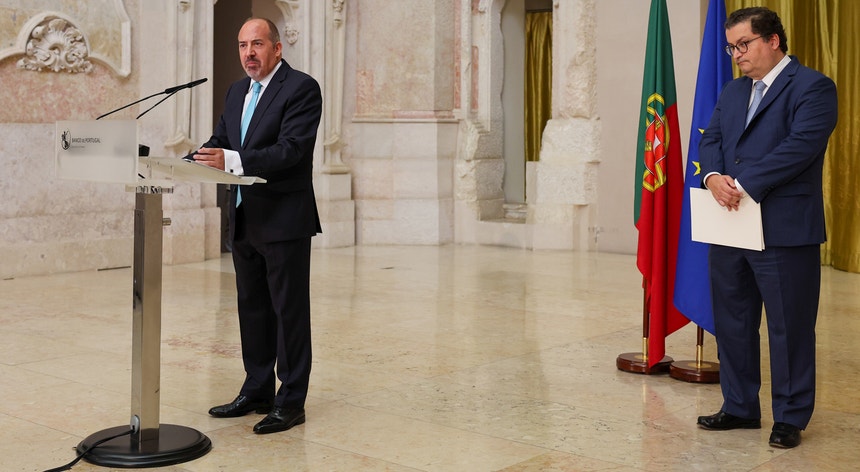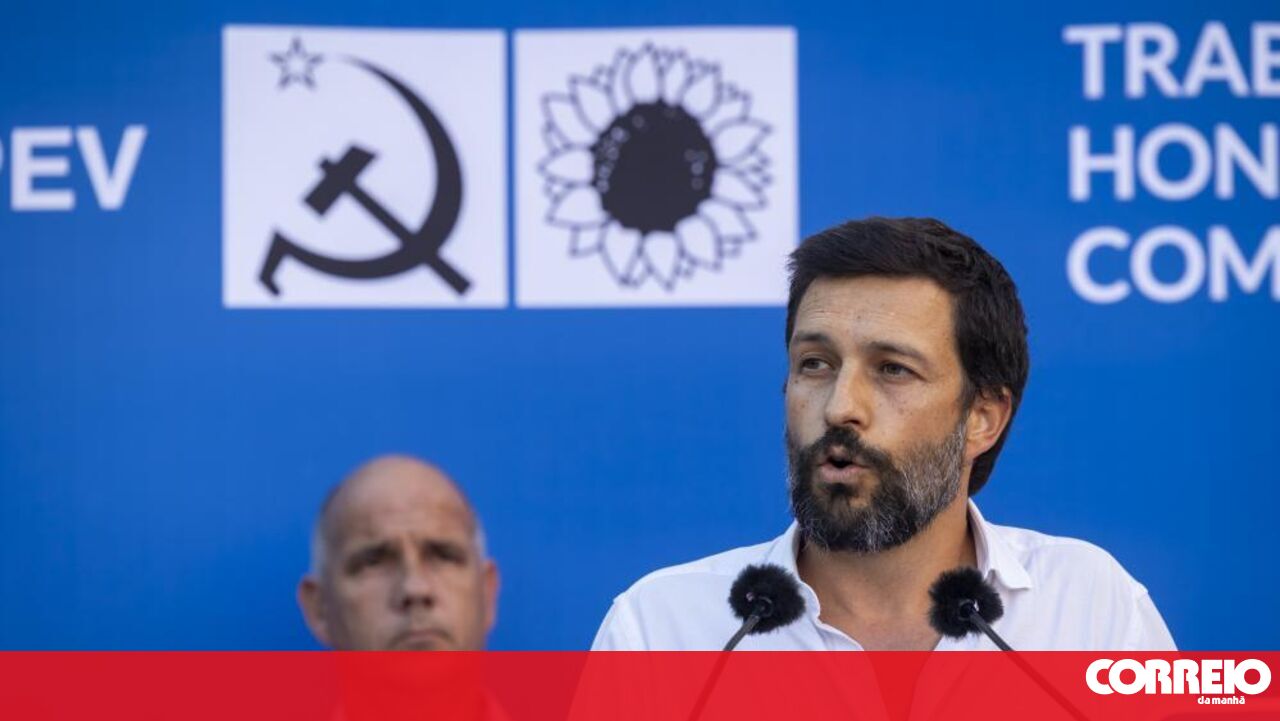
Corbis via Getty Images
The Meeting That Led to the Cancellation of the Farewell Lunch
The Bank of Portugal's Board of Administration was divided in its assessment of Mário Centeno's promotion to director. The still-governor did not like the outcome, and the traditional farewell lunch was canceled.
The tense atmosphere that marked the Bank of Portugal's board of administration meeting on September 23 led to the cancellation of the special lunch that was planned and would have marked Mário Centeno's farewell as governor. At issue was the evaluation of a proposal concerning Centeno himself and his future status at the Bank of Portugal—and the (still) governor ended up not attending the lunch, which was ultimately canceled.
The proposal involved equating Centeno to a director—which would place him, from the outset, at a higher salary level than the last one he had at the Bank of Portugal before leaving (to become Finance Minister under António Costa at the end of 2015), as he was then a deputy director.
Such an equation is legal, but a majority of administrators understood, in a close vote, that the matter should be evaluated during the term of the new governor, Álvaro Santos Pereira.
About 10 days later, in a long internal message sent to all departments of the Bank of Portugal, Mário Centeno made a point of showing his displeasure again (the first time was in Parliament) with the investigation conducted by Observador into the Bank of Portugal's new headquarters—"a reality of many hours, beyond the limit of physics." Between the accusation directed at those who allegedly did not respect "the history, values, and ethics of the Bank of Portugal" and the revival of the principles inscribed in the "poem of the Bank" that Centeno himself wrote in 2023, the still-governor appealed for the "good money" to expel the "bad money" in the future—a process that Centeno himself will witness, as he announced that he will remain at the institution "in the coming years."
In the meantime, the government made a point of emphasizing in the Council of Ministers Resolution appointing Álvaro Santos Pereira that the new governor has the "profile of skills and professional experience compatible with the exercise of leadership of the Bank of Portugal that ensures independence and transparency in its actions and, likewise, its credibility and affirmation as a public authority in matters of its attributions." A message to whom the government decided not to reappoint: Mário Centeno.
The Reunion That Led to the Cancellation of the Farewell Lunch
It was supposed to be the last meeting of Mário Centeno as governor of the Bank of Portugal on September 23. Just as it was agreed that, at the end of the meeting, the traditional farewell lunch for Centeno would follow in the boardroom, as usually happens with all administrators and governors who end their terms.
But neither was that meeting the last, because the government took a few more days to definitively appoint Álvaro Santos Pereira; nor did the farewell lunch happen. Everything because the working meeting ended badly and in a tense atmosphere that led to the cancellation of the lunch.
As Observador learned, the origin of the discomfort was a vote taken at the Bank of Portugal's board of administration meeting: the promotion of Mário Centeno as director of the Bank, considering that at that moment he has the status of deputy director.
The proposal was reportedly presented by Helena Adegas, the administrator in charge of human resources and close to Mário Centeno—who regularly received praise from him during his term. Since the departure of Hélder Rosalino last autumn, Adegas has shared the human resources portfolio with the governor himself. Adegas, who has been a staff member of the Bank of Portugal since 1985, was director of the markets department until she was promoted to administrator at the end of 2022 (still during the socialist government of António Costa).
Because it was a matter concerning Mário Centeno and his status within the supervisor's framework, the governor momentarily left the room to not participate in the vote (nor in the discussion), as required by the Bank of Portugal's rules and the law itself. The board of administration is composed of seven people, including the governor.
As Observador learned, the debate was lively and the vote was close, with a simple majority ultimately approving the postponement of the proposal's evaluation. The argument of those who voted in favor of the postponement was simple: the matter should be postponed until the term of the next governor, Álvaro Santos Pereira.
It is important to emphasize that the proposed promotion is permitted by law. The issue of postponement has only to do with a matter of transparency, not legality.
Upon returning to the room, Centeno expressed his displeasure at the division of the board regarding this matter—which worsened the tension already felt in the room.
It is common for the Bank of Portugal's services to prepare a lunch for the board of administration members on Tuesdays, the day the weekly meeting takes place at the supervisor. Although it is normal that not everyone participates in all lunches due to scheduling conflicts. Still, this was a special lunch because it was assumed that it might be the last in which Mário Centeno would participate as governor.
The consequence of the tension created around the postponement of the proposal to promote Centeno's own status was the cancellation of this farewell lunch.
All administrators and governors of the Bank of Portugal usually have similar lunches, with the gift given to those leaving in recent years typically being the same: a watch. One of the few exceptions happened with Teodora Cardoso, who left in February 2012: she received a top-of-the-line computer instead of the traditional watch.
Questioned by Observador, an official source from the Bank of Portugal had not responded, by the publication of this article, to a request for further clarification on the proposal voted on by the board.
The Poet Centeno, Self-Praise, the "Good Money" That Will Expel the "Bad Money," and the "Reality" of the New Headquarters Challenging the "Limit of Physics"
In a message with 1,610 words and 9,677 characters sent on October 3 to all departments of the Bank of Portugal with a strong focus on the first person singular ("like the poem of the Bank, which I wrote for the 2023 Meeting"), Mário Centeno addressed the institution's employees to state the "obvious": "it was an enormous privilege, honor, and pleasure to lead the Bank of Portugal between July 2020 and October 2025."
In the message, Mário Centeno also congratulated himself on the improvements introduced in the internal organization at his initiative and thanked all departments of the bank. Here are several examples:
- "Economic analysis, one of the flags of excellence of the Bank of Portugal, improved. In 2023, we started publishing estimates of the budget balance, committed to quarterly growth rates for all components of GDP, and launched Policies in Analysis, which addressed relevant economic policy topics";
- With "one eye on the spread and the effort rate," Centeno recalled that he traveled "the country to visit schools." "They were thousands of basic and secondary school students with whom we interacted and to whom we brought a bit of financial, economic, and statistical literacy. But, above all, the citizenship that the country needs. They were future colleagues of ours, students who are an integral part of the silent revolution that has propelled the country to leadership in education in Europe and the World."
- Cooperation with the PALOPs, which always existed, went "further" in the last five years, according to Centeno himself. "We joined financial literacy campaigns in Creole in several islands of Cape Verde. Where what is good at the Bank [of Portugal] arrives through the news, something we can't even imagine happening," reads his message.
- About the Department of Compliance and Risk, a kind of internal compliance of the Bank of Portugal, Mário Centeno praised the "international awards" that the department won and the fact that it "serves as a reference for other central banks outside and within the euro area." And he recalled the Latin motto by which Sport Lisboa e Benfica (of which Centeno is a fan) is known: "The risk of the Bank [of Portugal] is everyone's. E pluribus unum."
- He mentioned the "technological innovation" introduced in the Audit Department during his term that was reflected "in the way of acting" and mentioned that the "network I always sought came" from the Legal Services Department—although he recognized that the "court decisions favorable to the Bank [of Portugal]" have "roots prior to my term."
- The Sintra Forum, a meeting promoted by the European Central Bank that brings together the world's main central banks—and which was 'won' by the Bank of Portugal during Governor Carlos Costa's term—was also improved during Mário Centeno's term, through "cultural innovations, which received the highest praise."
- And, speaking of praise, Centeno made a point of mentioning the Governor's Support Office—that is, his most direct collaborators. As there were only four—"the office with the smallest number of collaborators in several years"—they were "an example to the rest of the Bank of how it is possible to do more with less." And Álvaro Novo, his chief of staff (whom Centeno appointed twice for different positions since July) and a faithful follower for a long time, also deserved a special word. "He quickly ended my written speeches, read to the audience's tedium. A list of topics, sometimes only handwritten by him, would have to be sufficient in itself to captivate," he recalled.
The end of Mário Centeno's message was marked by the theme of the Bank of Portugal's new headquarters.
First, Centeno confirmed that he was directly involved in the entire process, referring to the "endless demands" he made to the Department of Logistics and Facilities [DLI], led by Paulo Cardoso José. "The DLI first found it strange, but then delivered. Thank you very much. I know it wasn't easy. But I wasn't here for the obvious," the message reads. The still-governor (he will only be formally replaced this Monday at 10 a.m.) also made a point of referring to the new headquarters, located in Entrecampos (Lisbon), as "a reality of many hours, beyond the limit of physics."
And, finally, an indirect reference to the investigation into the new headquarters that Observador published in July (see here and here) based on extensive internal documentation from the Bank of Portugal. As he had already said in Parliament, where he had to give many explanations about a project whose "final value belongs to God", Mário Centeno considers that there was a collective "failure." "(...) And I regret, I deeply regret, that some acted disrespectfully towards the history, values, and ethics of the Bank of Portugal, when they infringed duties of confidentiality that govern our institution," he says.
The still-governor took the opportunity to quote "the poem of the Bank" that Centeno himself wrote "for the 2023 Bank Meeting and that Carlos Tê improved and set to music." And what does the poet Centeno say? "The Bank is the child of the liberal and republican revolution […] But its most sovereign function is to serve the interests of Portugal […] With ethics and morals, social capital. Our institution has the role of transmitting confidence to the country. The Bank is a faithful, the balance's faithful."
Hence, Mário Centeno wishes those who, in his view, disrespected "the history, values, and ethics of the Bank of Portugal," that "they may think that the Bank is our greatest good." And to the others, "the infinite majority," he leaves "a challenge": "That the good money expel the bad money. This is the motto I leave you."
Not only does Centeno believe that the workers "will" achieve such a result, but, he adds, the "Bank of Portugal will count on me in the coming years, as it has for over 30."
An indirect response to the new governor Álvaro Santos Pereira who, in his inauguration hearing in Parliament, stated: "I know what I would do. I would never stay at the bank after being governor—but each one does what they want."
Recall that former governors like Vítor Constâncio and Carlos Costa did not continue at the bank after the end of their terms.
Council of Ministers Recalls the "Independence" and "Transparency" of Santos Pereira
In this kind of silent war that marked the end of Mário Centeno's term, the still-governor's last days were also marked by the Council of Ministers Resolution appointing Álvaro Santos Pereira. It contains as an annex the conclusions of the reasoned opinion of the Budget, Finance, and Administration Commission that "recognizes the competence and technical experience of Dr. Álvaro Miguel Rodrigues dos Santos Pereira for the position of Governor of the Bank of Portugal." The opinion was approved by a large majority with the votes of PSD, CDS, Chega, and IL (and the abstention of PS).
But, above all, it can be read in the text of the Council of Ministers Resolution that Santos Pereira has the "profile of skills and professional experience compatible with the exercise of leadership of the Bank of Portugal that ensures independence and transparency in its actions and, likewise, its credibility and affirmation as a public authority in matters of its attributions."
To reinforce the issue of "independence," "transparency," and "credibility," Álvaro Santos Pereira's inauguration will be this Monday at the Bank of Portugal's headquarters—when the tradition has always been for the governor to be invested in the noble hall of the Ministry of Finance.












Comments
Join Our Community
Sign up to share your thoughts, engage with others, and become part of our growing community.
No comments yet
Be the first to share your thoughts and start the conversation!